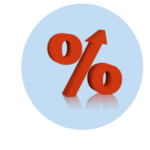Corporate FD
Key Features


What is Corporate FD ?
A Corporate Fixed Deposit (FD) is a type of investment offered by companies where you deposit a lump sum amount for a fixed period at a predetermined interest rate. These deposits are similar to regular fixed deposits offered by banks, but they’re issued by companies (as opposed to banks or financial institutions) to raise funds.
Here are some key features of corporate FDs:
Higher Interest Rates: Corporate FDs often offer higher interest rates compared to bank FDs, but this can vary based on the company’s credit rating and market conditions.
Risk Factor: Since these are issued by companies, the risk associated with corporate FDs is generally higher compared to bank FDs. The risk depends on the financial health of the issuing company.
Tenure: The investment period can range from a few months to several years, depending on the terms set by the company. Investors can choose a tenure that suits their investment horizon.
Credit Ratings: It’s important to check the credit rating of the issuing company before investing, as this will give you an idea of the risk involved. Ratings are provided by agencies like CRISIL, ICRA, or CARE. A higher rating indicates lower risk, while a lower rating suggests higher risk.
Taxation: The interest earned on corporate FDs is taxable as per the investor’s income tax slab. However, companies often deduct TDS (Tax Deducted at Source) on the interest paid if it exceeds a certain threshold.
Liquidity: Corporate FDs generally have lower liquidity compared to bank FDs. There may be penalties or reduced interest rates if you withdraw the deposit before the maturity date.
Investing in corporate FDs can be attractive for those looking for higher returns, but it’s essential to assess the associated risks and the issuing company’s financial stability, industry sector, and the overall economic environment.
What Risk Mitigation measures are in place ?
To mitigating risks in corporate fixed deposits (FDs) is crucial for protecting your investment.
Here are some strategies to consider:
Assess Credit Ratings: Always check the credit rating of the corporate FD before investing. Credit rating agencies like CRISIL, ICRA, and CARE assess the creditworthiness of companies. Higher-rated FDs (like AAA or AA ratings) are generally considered safer than lower-rated ones. However, even highly-rated corporate FDs are not entirely risk-free.
Diversification: Avoid putting all your money into a single corporate FD. Diversify your investments across different companies and sectors to reduce the impact if one particular investment underperforms or defaults.
Review Financial Health: Analyse the financial health of the issuing company. Look at its balance sheet, profitability, cash flow, and debt levels. Strong financials generally mean lower risk.
Understand Terms and Conditions: Carefully read the terms and conditions of the FD, including penalties for premature withdrawal, interest rate, and maturity period. This will help you make informed decisions and avoid surprises.
Monitor Economic Conditions: Be aware of the broader economic environment and market conditions that could affect the company’s performance. The risk associated with corporate FDs can be impacted by economic downturns or industry-specific issues.
Consult Financial Advisors: Consult with financial advisors or experts who can assess the risk and suitability of corporate FDs for your investment portfolio.
Invest Within Safe Limits: Avoid over-investing in corporate FDs. Ensure that your overall portfolio is balanced and not overly concentrated in fixed deposits, especially with higher risk profiles.
Stay Updated on Company News: Regularly check for any updates or news about the issuing company. Significant changes in its operations, management, or financial status could signal potential risks.
By implementing these measures, you can better manage and mitigate the risks associated with corporate fixed deposits.
Conclusion
Investing in corporate fixed deposits can offer higher returns compared to traditional bank deposits, but it also comes with higher risks.
